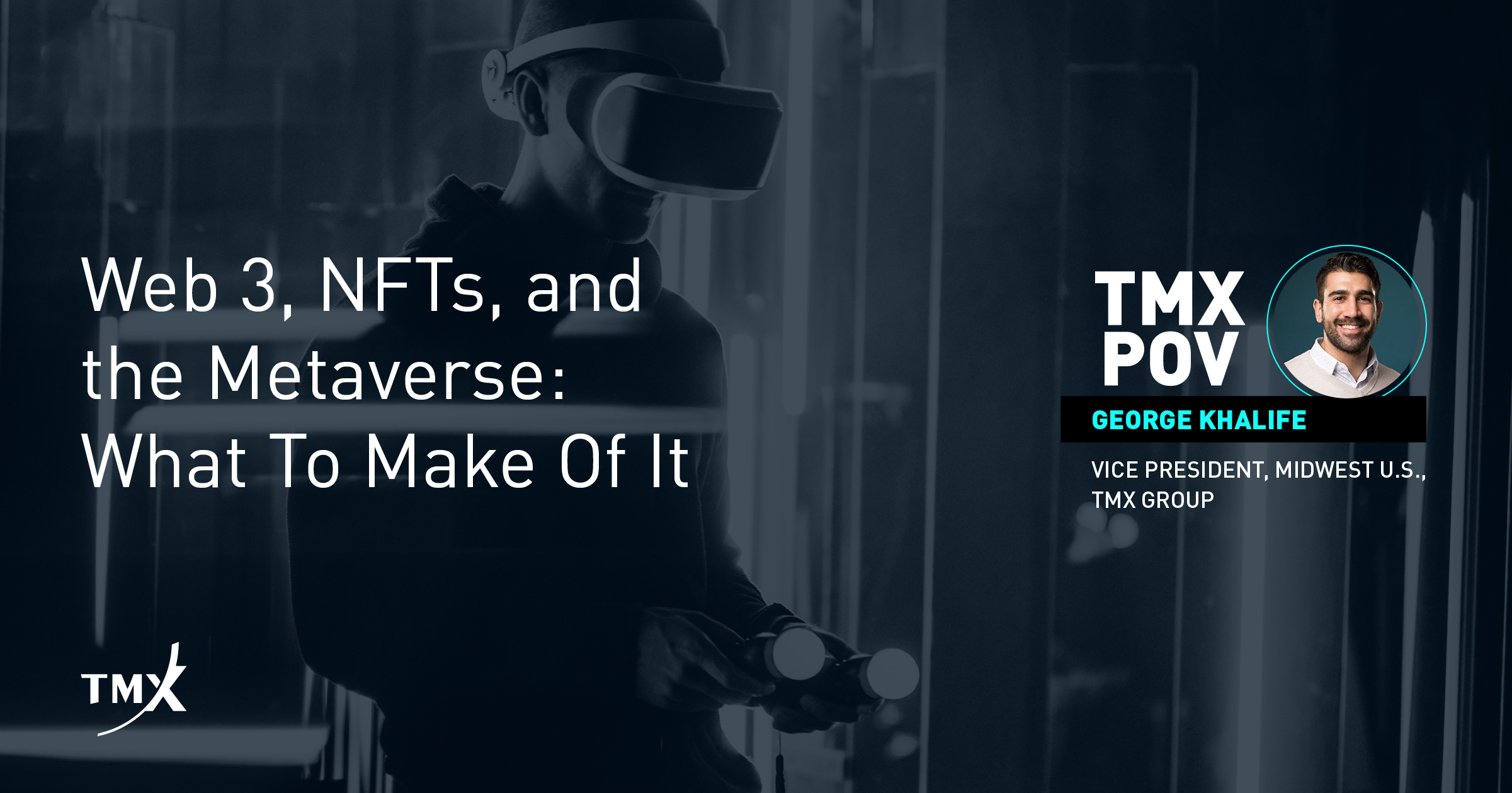TMX POV - Web 3, NFTs, and the Metaverse: What to Make Of It

Evolution of the Internet
The internet has always been about connecting people.
- Web 1.0 allowed us to search for information and read it.
- Web 2.0 allowed us to contribute content and interact with other users online.
- Web 3.0 will allow us to connect with others in a community-owned virtual world.
FIGURE 2: ILLUSTRATIVE KEY FEATURES OF WEB 1.0, 2.0 & 3.0
| Web 1.0 | Web 2.0 | Web 3.0 | |
|---|---|---|---|
| Interact | Read | Read-Write | Read-Write-Own |
| Medium | Static Text | Interactive Content | Virtual Economies |
| Organization | Companies | Platforms | Networks |
| Infrastructure | Personal Computers | Cloud & Mobile | Blockchain Cloud |
| Control | Decentralized | Centralized | Decentralized |
Source: The Metaverse: web 3.0 virtual cloud economies (by Grayscale)
When mobile internet came out, it changed how, where, when, and why we used the internet. This changed the products, services, and companies we used, which changed our business models, culture, and politics – Web 3 has the potential to go through the same process.
The Metaverse and Web 3 Are Not the Same
The metaverse and Web 3 have been used interchangeably, and while they both point to a new vision for the future, they are different concepts.
The metaverse feels vague and speculative because it is; it hasn't really taken form yet. The reality is the metaverse will require everyone's input and participation to truly take form. Web 3, on the other hand, emerged as a result of the reaction people had to how closely guarded platforms like Facebook and YouTube operate in relation to data extraction, privacy breaches and censorship of content.
"By building on the blockchain, data is open and distributed and collectively owned by peer-to-peer networks. As a result, users own their data, peer-to-peer transactions can bypass middlemen and data lives on the blockchain as a public good that anyone can contribute to and monetize.[1]" Basically suggesting that people in Web 3 will have the ability to own a piece of the internet, not just interact with it (i.e. read + write).
The metaverse as an idea, isn't new. The concept originated from Snow Crash, a dystopian novel from the 1990s in which people flee the crumbling real world to be fully immersed in a virtual one2. It wasn't made mainstream, however, until Mark Zuckerberg started talking about it publicly. As you probably know by now, Facebook rebranded its corporate name to "Meta" in October of 2021. Under this new guise, the company plans to build out a deeper digital world, one consisting of virtual and augmented reality; "we'll be able to feel present, like we're right there with people no matter how far apart we actually are" says Zuckerberg3. Meta has already dedicated $10 billion in 2021 to the metaverse, as well as $150 million to developers to create new apps, games and immersive programs.
Why did it take nearly 30 years to pick up steam?
According to Vice, the industry was somewhat operating in stealth in tech hotbeds like Silicon Valley, slowly building momentum and interest. It wasn't until blockchain and NFT (Non-Fungible Token) technology came around that it provided a way for two parties to transact directly without a middle person using unique tokens4. Non-fungible is by definition something that cannot be copied, substituted or subdivided – because it carries a unique digital identifier recorded on the blockchain. An NFT, therefore, is a unique digital certificate that clearly identifies who owns a photo, video, or other digital asset.
Also, living/working remotely during the COVID-19 pandemic accustomed lots of people to a life spent online.
So, with the convergence of technology, timing, and changing consumer behavior…we have mainstream mania. Within days, people were bidding on digital land during the gold rush in California; the Metaverse Group purchased 116-parcel estate "in the heart" of Decentraland's Fashion Street district (a 3D virtual world browser-based platform) for $2.4 million5. Someone reportedly paid $450,000 to be Snoop Dogg's neighbor in a virtual world called the Sandbox6.
Crazy right?
Digital land sales topped $500 million in 2021 and are expected to compound at a rate of 31% per year through 20287. According to Grayscale, the crypto investment giant, the metaverse may represent over a $1 trillion annual revenue market opportunity.
That doesn't seem far-fetched given today, approximately one-third of our lives (or around eight hours/day) is already spent watching TV, playing games, or on social media8. So it's only reasonable to assume that the things we value are shifting with technology. It's not so much how or what we value, but rather how it's represented. Art is a good illustration of this; the painting itself is not necessarily what we value, it's who the artist is behind the piece, the story behind the work, what the image represents, and how much people (collectively) are willing to pay for it.
Because owning something special that people recognize and ascribe value to is social currency. That currency is now digital.
In Comes the Case for NFTs
One way it's been digitized is through the use of NFTs.
just setting up my twttr
— jack⚡️ (@jack) March 21, 2006
Take the tweet above for instance. It was the first tweet that Jack Dorsey, the founder of Twitter, published on the platform in 20069. It's now owned by Sina Estavi, a Malaysian-based buyer, who purchased the tweet for $2.9 million - and compared the purchase to buying the Mona Lisa painting. Sina received a certificate, digitally signed and verified by Jack Dorsey, as well as the metadata of the original tweet. The data will include information such as the time the tweet was posted and its text contents.
Christie's is proud to offer "Everydays - The First 5000 Days" by @beeple as the first purely digital work of art ever offered by a major auction house. Bidding will be open from Feb 25-Mar 11.
— Christie's (@ChristiesInc) February 16, 2021
Learn more here https://t.co/srx95HCE0o | NFT issued in partnership w/ @makersplaceco pic.twitter.com/zymq2DSjy7
Or take this example of a digital art piece created by the now-famous artist known as Beeple. In October of 2021, Beeple sold this piece for $69 million at Christie's which positioned him "among the top three most valuable living artists" according to the auction house10. There are some factors that can explain why Beeple's work is sought after. He developed a large fan base, with over 2.5 million followers across social channels. He also started a project called "Everydays" where he creates and publishes a new digital artwork every single day. The project is now in its 14th year. The piece you see above is called "Everydays: The First 5000 Days", which is a collage of Beeple's work starting at the beginning of the project. The auction's winner doesn't get much: a digital file, mostly, plus some vague rights to present the image.

Source: Dapper Labs & NBA Properties, Inc.
Another example is the NBA selling digital moments of really special plays and games for hundreds of thousands of dollars. This one here, a moment of Lebron James dunking, sold for $210,00011.
There are also utility NFTs; which assign a use to the digital asset outside of owning a piece of artwork. A utility NFT can be where someone receives a physical piece of art that matches the NFT they purchased; it could be unique access to an event, exclusive in-person memberships, etc. Here's a list of some of the top utility NFTs on the market now if you want to check out some examples.
Not Everyone is in Favor Though
But Web 3 and the applications that come with it have received skepticism from notable names like Jack Dorsey, who argues that because VCs are heavily invested in Bitcoin and infrastructure upon which Web 3 is based, the advocacy of decentralized technology from the user's standpoint is disingenuous. "Web 3 is ultimately a centralized entity with a different label," said Dorsey12.
Tim O'Reilly, the author who coined the phrase Web 2 back in 2004, also warned this month it was too early to get excited about Web 312. Time Magazine's Person of the Year, Elon Musk, trolled simply:
Web3 sounds like bs
— Elon Musk (@elonmusk) December 2, 2021
It's important to remember that it's still early days for these technologies. To put things in perspective, Metaverse virtual worlds has nearly 50,000 all-time users (active wallets as proxy), which was up around 10x since the beginning of 2020. There are roughly 412,000 all-time NFT users8. Compared to Facebook's approximate 3 billion, those numbers are still a speck in the dust. Although that may change.

Source: The Metaverse: web 3.0 virtual cloud economies (by Grayscale)
Interestingly, if you look at the web search interest for both NFTs (in blue) and Metaverse (in red) within the past 12 months, you can see a recent decline for both search terms.

Source: Google Trends
This backlash, however, isn't stopping big tech as well as Fortune 500 companies from getting involved. Walmart for instance "quietly" filed at least seven applications with the U.S. Patent and Trademark Office to issue its own cryptocurrency and NFTs within a metaverse. Nike bought a digital art studio so that it could release NFT-based sneakers. Microsoft pitched its $69 billion acquisition of game-maker Activision Blizzard as a metaverse play13. Even the investment banking giant, JPMorgan Chase, has set up shop in Decentraland-one of the world's most popular metaverse platforms. The bank predicts the metaverse will become a $1 trillion market opportunity in yearly revenues14.
The Takeaway
There's certainly a lot of noise surrounding this emerging technology - parts of it, as we've seen, overdone with hype and fad culture, and other parts interesting and exciting to witness.
While NFTs and digital items could be our clothing, identities, status signifiers. And VR could be more than just a side alley of gaming. Right now, Web 3 tech is still primitive and taking shape.
We'll just have to wait and see what will actually become the reality of tomorrow.
George Khalife
VP Capital Formation (Midwest U.S.),Toronto Stock Exchange and TSX Venture Exchange
george.khalife@tmx.com
Follow George on LinkedIn
Sources:
1 Coindesk - https://www.coindesk.com/layer2/2021/12/21/web-3-and-the-metaverse-are-not-the-same/, Posted on Dec 21, 2021 at 11:24 a.m. CST
2 CNBC - https://www.cnbc.com/2021/11/03/how-the-1992-sci-fi-novel-snow-crash-predicted-facebooks-metaverse.html , Posted on Thursday, Oct. 28, 2021
3 Guardian News & Media - https://www.theguardian.com/technology/2021/oct/28/facebook-name-change-rebrand-meta , Posted on Thursday, Oct. 28, 2021
4 Vice Media Group - https://www.vice.com/en/article/k7wany/zillow-sells-thousands-of-homes-to-controversial-rental-powerhouse , Posted on January 24, 2022, 8:00am
5 Vox Media - https://www.vox.com/recode/2021/12/2/22812608/metaverse-real-estate-meta , Posted on Dec 2, 2021, 10:10am EST
6 Decrypt Media - https://decrypt.co/87524/someone-paid-450k-snoop-dogg-metaverse-neighbor , Posted on Dec. 3, 2021
7 The Motley Fool - https://www.fool.com/investing/2022/02/22/a-piece-of-digital-real-estate-just-sold-for-43-mi/, Posted on Feb 22, 2022 at 9:45 a.m.
8 Grayscale Investments - https://grayscale.com/wp-content/uploads/2021/11/Grayscale_Metaverse_Report_Nov2021.pdf , Posted on Nov, 2021
9 BBC - https://www.bbc.com/news/business-56492358#:~:text=Twitter%20founder%20Jack%20Dorsey%27s%20first,by%20Mr%20Dorsey%20for%20charity , Posted on Mar. 23, 2021
10 Vox Media - https://www.theverge.com/2021/3/11/22325054/beeple-christies-nft-sale-cost-everydays-69-million , Posted on Mar. 11, 2021
11 Hustle Con Media - https://thehustle.co/why-one-guy-paid-208k-for-a-video-clip-of-lebron-james-dunking/, Posted on Mar. 7, 2021
12 CBS Interactive Inc. - https://www.cbsnews.com/news/web3-blockchain-crypto-nft-metaverse-explainer/, Posted on Jan. 3, 2022 at 7:45 a.m.
13 Decrypt Media - https://decrypt.co/90747/web3-founders-welcome-walmart-nfts-metaverse , Posted on Jan. 19, 2022
14 Fortune Media - https://fortune.com/2022/02/16/jpmorgan-first-bank-join-metaverse/, Posted on Feb. 16, 2022 at 11:35 a.m. CST
Copyright © 2022 TSX Inc. All rights reserved. Do not copy, distribute, sell or modify this document without TSX Inc.'s prior written consent. The views, opinions and advice provided in this article reflect those of the individual author. This information is provided for information purposes only. Neither TMX Group Limited nor any of its affiliated companies guarantees the completeness of the information contained in this publication, and we are not responsible for any errors or omissions in or your use of, or reliance on, the information. This publication is not intended to provide legal, accounting, tax, investment, financial or other advice and should not be relied upon for such advice. The information provided is not an invitation to purchase securities listed on Toronto Stock Exchange and/or TSX Venture Exchange. TMX Group and its affiliated companies do not endorse or recommend any securities referenced in this publication. TMX, the TMX design, The Future is Yours to See., Toronto Stock Exchange, TSX, TSX Venture Exchange, TSXV and Voir le futur. Réaliser l'avenir. are the trademarks of TSX Inc. All other trademarks used in this document are the property of their respective owners.


